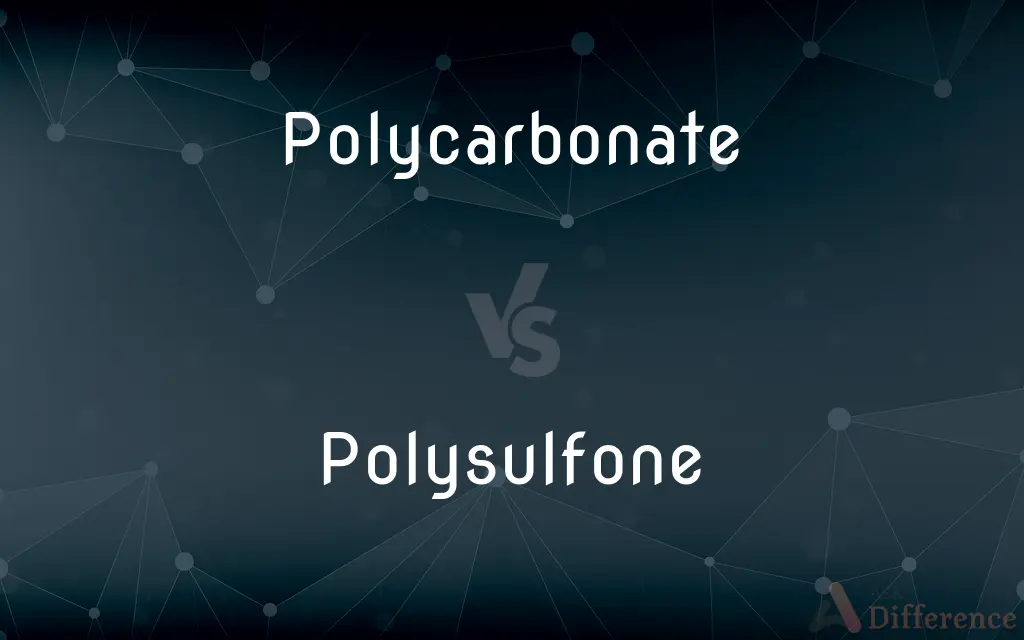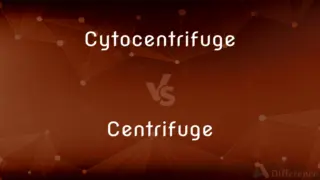Polycarbonate vs. Polysulfone — What's the Difference?
Edited by Tayyaba Rehman — By Maham Liaqat — Updated on March 27, 2024
Polycarbonate is a durable, transparent plastic known for its high impact resistance and versatility in applications like eyewear and CDs, whereas polysulfone is a high-performance thermoplastic characterized by its excellent thermal stability.

Difference Between Polycarbonate and Polysulfone
Table of Contents
ADVERTISEMENT
Key Differences
Polycarbonate (PC) is widely recognized for its impressive combination of optical clarity and mechanical strength, making it an ideal choice for products requiring transparency and durability, such as bullet-proof glass and various consumer goods. On the other hand, polysulfone (PSU) distinguishes itself with superior thermal stability and chemical resistance, which makes it suitable for high-temperature applications and environments where exposure to harsh chemicals is common, like in certain medical devices and food processing machinery.
One of the key advantages of polycarbonate is its exceptional impact resistance. It can absorb significant energy without breaking, which is why it's used in safety goggles, helmets, and vehicle parts. Polysulfone, while also durable, excels more due to its ability to withstand continuous exposure to high temperatures and aggressive cleaning agents without degrading, a property valued in the healthcare and aerospace industries.
When it comes to processing and molding, polycarbonate is relatively easy to work with, allowing for the production of complex shapes and fine details, which is advantageous in the manufacturing of consumer electronics and compact discs. Polysulfone, however, requires more stringent processing conditions due to its higher melting point, limiting its use to specialized applications where its unique properties are needed.
In terms of environmental resistance, polycarbonate offers good resistance to weathering, making it suitable for outdoor applications. It does, however, have a tendency to yellow over time when exposed to UV light, a limitation that can be mitigated with the addition of UV stabilizers. Polysulfone is inherently more resistant to UV radiation and does not require additional stabilizers to maintain its physical properties and appearance over time.
Both materials are regarded for their electrical insulating properties, but polysulfone's higher thermal resistance makes it a preferred material for electrical connectors and components that must operate in elevated temperatures or fluctuating thermal conditions. Polycarbonate, while also used in electrical applications, is more commonly selected for its balance of electrical insulation and impact resistance in consumer-level products.
ADVERTISEMENT
Comparison Chart
Impact Resistance
Extremely high
High, but less than polycarbonate
Thermal Stability
Good, up to 135°C
Superior, withstands temperatures up to 180°C
Chemical Resistance
Good against water and some chemicals
Excellent, especially against acids and bases
Transparency
Very high, suitable for optical applications
High, but often slightly amber in color
UV Resistance
Moderate, prone to yellowing
High, more resistant to UV-induced degradation
Processing Conditions
Easier to mold and shape
Requires higher temperatures for processing
Applications
Safety equipment, CDs, lenses
Medical devices, food industry equipment
Compare with Definitions
Polycarbonate
A durable, transparent plastic used for bullet-proof glass.
The bank installed polycarbonate windows for enhanced security.
Polysulfone
Features good electrical insulating properties for electronic applications.
Electrical connectors made from polysulfone ensure safety in high-temperature conditions.
Polycarbonate
Commonly found in everyday items like DVDs and water bottles.
Polycarbonate bottles are lightweight yet shatter-resistant.
Polysulfone
A high-performance plastic with excellent thermal stability.
Polysulfone components are used in aerospace engineering for their heat resistance.
Polycarbonate
Known for its high impact resistance, ideal for safety gear.
The climbers' helmets are made of polycarbonate to protect against falls.
Polysulfone
Resists degradation from acids and bases, suitable for medical devices.
Surgical instruments made from polysulfone withstand sterilization processes.
Polycarbonate
Used in optical applications due to its clarity.
Eyeglass lenses made from polycarbonate offer both protection and clear vision.
Polysulfone
Maintains physical properties at elevated temperatures.
The kitchenware made of polysulfone can be used in microwaves safely.
Polycarbonate
Easily molded into complex shapes, making it versatile.
The polycarbonate smartphone cases are both stylish and durable.
Polysulfone
Often used in the food industry for its chemical resistance.
Polysulfone filters are essential in the dairy industry for milk processing.
Polycarbonate
Polycarbonates (PC) are a group of thermoplastic polymers containing carbonate groups in their chemical structures. Polycarbonates used in engineering are strong, tough materials, and some grades are optically transparent.
Polysulfone
Polysulfones are a family of high performance thermoplastics. These polymers are known for their toughness and stability at high temperatures.
Polycarbonate
Any of a group of thermoplastics that are linear polyesters of carbonic acid, especially those derived from bisphenol A and phosgene, characterized by high-impact strength, light weight, and flexibility, and used as shatter-resistant substitutes for glass.
Polysulfone
(chemistry) Any of a several classes of thermoplastic polymers whose repeat units contain a sulfone
Polycarbonate
(chemistry) Any of a range of polymers of aromatic carbonates; they are used to make light, flexible alternatives to glass. Abbreviation: PC
Common Curiosities
What is polycarbonate used for?
Polycarbonate is used in applications requiring high impact resistance and transparency, like safety glasses, DVDs, and vehicle parts.
Can polycarbonate withstand high temperatures?
Polycarbonate has good thermal resistance up to 135°C, making it suitable for many applications but less so for high-temperature environments compared to polysulfone.
Is polysulfone transparent like polycarbonate?
Polysulfone is transparent but often has a slight amber tint, whereas polycarbonate offers clearer transparency.
Can polycarbonate be used outdoors?
Yes, but it may yellow over time due to UV exposure; UV stabilizers can mitigate this effect.
How are polycarbonate and polysulfone processed?
Polycarbonate is easier to mold and shape due to its lower melting point, while polysulfone requires higher processing temperatures.
Why is polysulfone preferred in medical applications?
Due to its excellent thermal stability and chemical resistance, making it ideal for devices that require sterilization.
Which material is better for food contact applications?
Polysulfone, due to its excellent chemical resistance and stability at high temperatures, is often preferred for food contact applications.
How do the electrical properties of polycarbonate and polysulfone compare?
Both offer good electrical insulation, but polysulfone's higher thermal resistance makes it more suitable for high-temperature electrical applications.
Is polysulfone expensive?
Polysulfone is generally more expensive than polycarbonate due to its superior performance characteristics and processing requirements.
Are there environmental concerns associated with polycarbonate?
Polycarbonate can release BPA under certain conditions, which has raised health and environmental concerns.
Which is more chemically resistant, polycarbonate or polysulfone?
Polysulfone offers superior chemical resistance, particularly against acids, bases, and other harsh substances.
What makes polysulfone special in the aerospace industry?
Its ability to withstand continuous high temperatures and resist chemical degradation makes it suitable for aerospace applications.
Can polycarbonate be recycled?
Yes, polycarbonate can be recycled, although its recycling rate and facilities may vary by region.
Do polycarbonate and polysulfone have similar densities?
Their densities are somewhat similar, with polycarbonate being slightly less dense than polysulfone.
Share Your Discovery

Previous Comparison
Annoyed vs. Vexed
Next Comparison
Cytocentrifuge vs. CentrifugeAuthor Spotlight
Written by
Maham LiaqatEdited by
Tayyaba RehmanTayyaba Rehman is a distinguished writer, currently serving as a primary contributor to askdifference.com. As a researcher in semantics and etymology, Tayyaba's passion for the complexity of languages and their distinctions has found a perfect home on the platform. Tayyaba delves into the intricacies of language, distinguishing between commonly confused words and phrases, thereby providing clarity for readers worldwide.














































